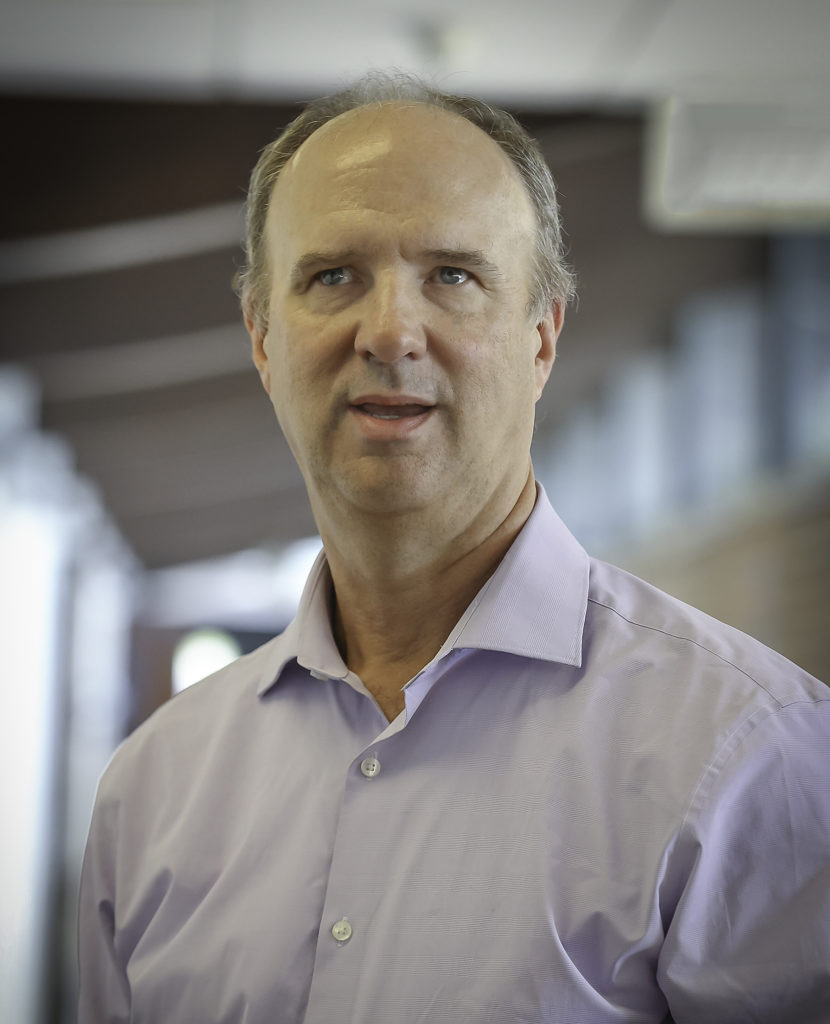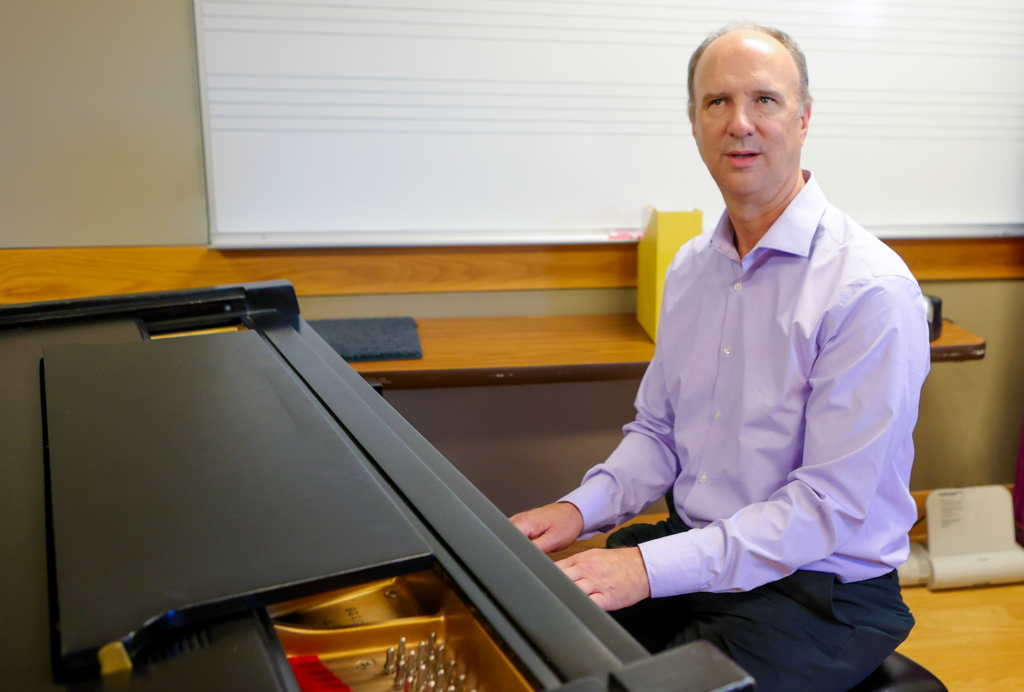The hope is that in-person performances return this fall
Today for “Faculty Spotlight” we’re sitting down with Dr. Frederick Moss, the new Department Representative for Music and Theatre.
Schoolcraft College: Hello, Dr. Moss, and congratulations on your new role! To start out, could you please tell us about your position at Schoolcraft College, how long you have been with us and what classes you teach?

Frederick Moss: I began teaching at Schoolcraft in the fall of 2001. My charge was to teach one section of Music 107, which is music for elementary school teachers. It was a wonderful diversion from writing my dissertation. When the dissertation and doctorate were completed, my work at Schoolcraft expanded to include teaching music appreciation, popular music in America, and applied instrumental music studio class.
For now, I will continue to teach the same classes I have been teaching. The primary new responsibilities for me will include overseeing the music and theater departments, representing those departments at meetings and functions across campus, working with other faculty to recruit students for music and theater, and assist with sharing the good word regarding music and theater with the larger community.
SC: What prompted your interest in music?
Frederick Moss: I do not remember not being interested in music. My earliest musical memory is listening to my sister practice the violin when I was probably no more than 3 years old. On some level, I remember thinking, “I’m going to do that someday.” Legendary singer Tony Bennett said, “I can’t not sing.” His words very much describe my relationship with music.
SC: We understand you play both the clarinet and the piano. How often do you perform and what do you like about each of those instruments?
Frederick Moss: Clarinet is my main public performance avenue. As a youngster, I rather stumbled upon it as my best friend in fifth grade band was playing it also. I grew to absolutely love the sound of the instrument. As I began learning the clarinet literature, I fell in love with it also.
Piano has become my own personal “music therapy.” Sitting down and playing the piano has become like sitting in a wonderfully comfortable easy chair for me, though I have played in restaurants and for numerous weddings and private parties. I also do play the piano in class to accompany my students or provide examples of various ideas in music.
Regarding clarinet performance, in the last few years, I have appeared regularly on the faculty recital at Schoolcraft. Thanks to the pandemic, the clarinet has taken a bit of a back seat as I have had a LOT to learn about teaching online. A couple of my music faculty colleagues and I are very interested in developing a chamber music ensemble, however, and I am really looking forward to that type of collaboration.
SC: It’s no secret that funding for the arts in elementary schools, middles schools and high schools have been drastically reduced in recent years. You have taught several courses related to instructors who want to teach music. In your opinion, why is it important for children to be exposed to the arts?
“My main goal is to broaden the understanding of the community well beyond our campus perimeter regarding the good things that are going on in music and theater at Schoolcraft.”
Dr. Frederick Moss, Department Representative for Music and Theatre
Frederick Moss: Humans are musical beings. We are also mathematical beings and linguistic beings and all manner of other kinds of beings. In education, we have to make a decision regarding the extent to which we want to shape the whole person or only those aspects.
In schooling, we have taken for granted subjects like math, science, and language arts. I vote for teaching the whole person in school with a highly qualified music teacher in the same way, generally, we intend to have high-qualified teachers for math, science, and language arts.
I am a big fan of STEM (science, technology, engineering, and mathematics) programs, but I am an even bigger fan of STEAM initiatives (science, technology, engineering, arts, and mathematics) where, at least in theory, the arts stand right alongside those other important academic areas.
SC: The Music and Theatre departments at Schoolcraft College have been well-respected for many years, with the performances, recitals and productions enjoyed by community members. What are your goals for the departments?
Frederick Moss: My main goal is to broaden the understanding of the community well beyond our campus perimeter regarding the good things that are going on in music and theater at Schoolcraft. I often am surprised by some version of the following comment: “I didn’t know Schoolcraft had a music department.”
My sense is that a significant number of people are similarly unaware of what we have to offer regarding theater. My colleagues work tirelessly to develop courses and performances, so I really want to get the word out that Schoolcraft is the place to come to either study or enjoy a performance in those areas.
SC: What do you like best about teaching at Schoolcraft College?
Frederick Moss: I love the “community” in “community college.” When I started teaching at Schoolcraft, I was struck by the degree to which a really kind and caring community existed on campus. As I have taken on more classes and participated in committees, I have enjoyed becoming more and more a part of the campus community. I look forward to deepening that relationship as a full-time faculty member.

Dr. Frederick Moss is a talented performer of the piano and the clarinet.
SC: Will we have live performances on campus this year? Can you provide any updates?
Frederick Moss: Of course, everything is subject to what happens regarding the pandemic, but we are working toward live music performances on campus as early as December and live theater performances in winter. In the meantime, look for some more online events during the fall.
SC: You also serve as a member of our DEI Task Force. Please tell us why you wanted to be part of that.
Frederick Moss: I have long felt that diversity is one of the great spices of life. My greatest personal growth has occurred when I have opened myself to learning as much as I can about individuals who have life experiences different from my own. Sometimes that learning has been difficult or even painful as I have had to examine assumptions I was holding unknowingly about people, but it has always been worth it.
In these complicated times, I felt that a diversity, equity, and inclusion task force could do a lot to foster more opportunity for us all to learn more about each other as our own campus community becomes more and more diverse. In addition, as a visually impaired person, I welcomed the opportunity to represent disability at the DEI table.
SC: Thank you, Dr. Moss. Is there anything else you would like to add?
Frederick Moss: Go Ocelots!
